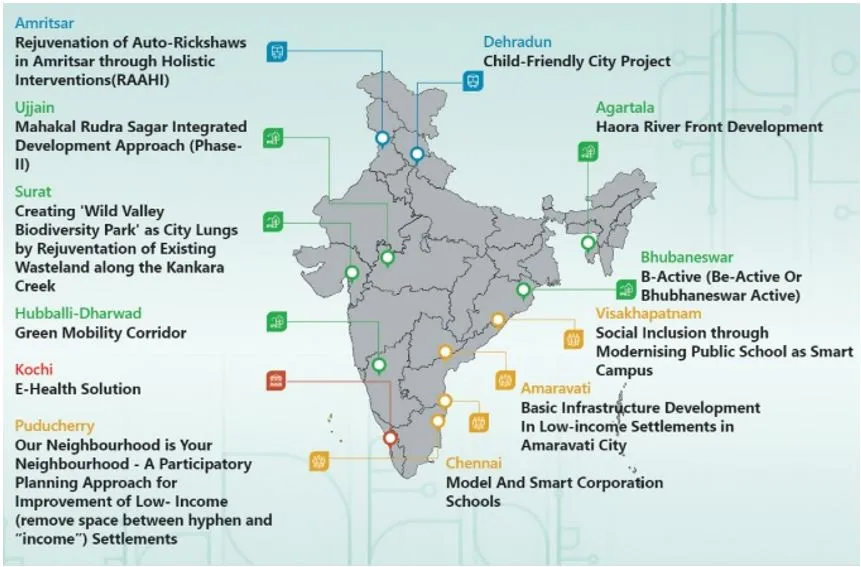

4th July 2024 (10 Topics)
Context
The Ministry of Housing and Urban Affairs has extended the deadline for the Smart Cities Mission till March 2025, allowing cities to complete ongoing projects, which account for around 10% of the total projects.
What is the concept of Smart Cities?
- The concept of smart cities emerged after the 2009 financial crash. It aimed to integrate urban centres with advanced communication networks and infrastructure.
- In India, the Smart Cities Mission (SCM) was initiated in 2015, aiming to develop 100 cities.
- Need of smart cities in India (unprecedented urban expansion):
- By 2030 India will be home to 60 cities with a population of more than 1 million and 6 megacities with a population of more than 10 million.
- Significant challenges hindering urban development and economic growth:
- Poor local governance
- Inadequate infrastructure and services
- Outdated urban planning
- Megacities (Delhi, Mumbai) are regarded as the economic engines of India, and yet every year, heavy rainfall lasting a couple of hours or days causes havoc there.
- Slums
Smart Cities’ Report Card (Progress so far)
- As of July 3, 2024, the 100 cities involved in the Smart Cities Mission have successfully completed 7,188 projects, which accounts for 90% of the total projects planned. These projects amount to ?1,44,237 crore. Additionally, 830 more projects worth ?19,926 crore are nearing completion.
- Budget Allocation and Utilization:
- The Government of India (GOI) allocated ?48,000 crore for the Smart Cities Mission.
- As of now, GOI has released ?46,585 crore, which is 97% of the allocated budget.
- Cities have utilized 93% of the released funds for various development projects.
- Financial Support: GOI has provided full financial support to 74 out of the 100 cities participating in the Mission.
- Multi-Sectoral Projects: Across the 100 cities, more than 8,000 multi-sectoral projects are underway, with a combined worth of approximately ?1.6 lakh crore.

Challenges
- Urban Local Bodies (ULBs) lack core competence, trained manpower and finances for completion of urban infrastructure projects.
- Local challenges related to land, labor etc., has also led to slowdown in progress.
- Irregularities in implementation of works such as redoing of same work again & duplication of work, project cost higher than the market rate, frequent dropping of projects after finalization of proposals, etc.
- Special Purpose Vehicles (SPVs): SPVs face uncertainty as they won't receive further funding for operations, including Integrated Command and Control Centers (ICCCs).
- SPVs can't initiate new projects with Mission funding since the original Smart Cities Mission period ended in June 2021.
Solution:
- Information and communication technology, sensors, geospatial, IoT, AI and blockchain are crucial to tackle the emerging problems in the city and maintain law and order through detailed data analysis.
- Geospatial visualization, HD maps, and interactive 3D models and dashboards are also of great help.
PYQQ1: What are ‘Smart Cities’? Examine their relevance for urban development in India. Will it increase rural-urban differences? Give arguments for ’Smart Villages’ in the light of PURA and RURBAN Mission. (2016) Q2: Discussion the various social problems which originated out of the speedy process of urbanization in India. (2013) |
More Articles


